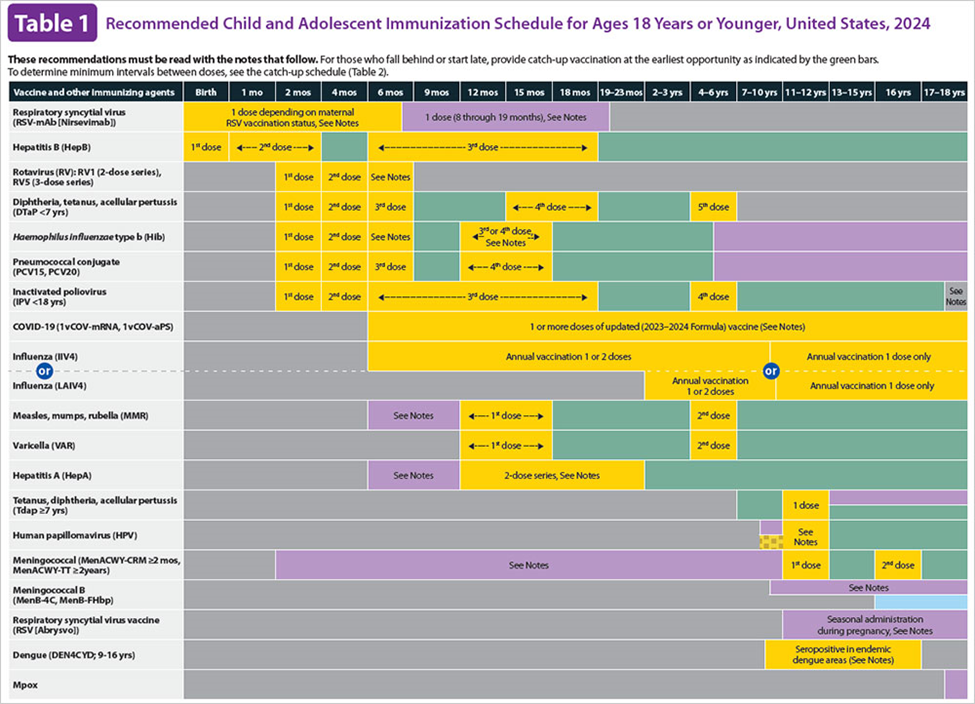A nurse is preparing to administer vaccines to a 4-month-old infant. Which of the following vaccines should the nurse plan to administer?
Influenza
Rotavirus
Measles, mumps, rubella (MMR)
Varicella (VAR)
The Correct Answer is B
A. Influenza:
The influenza vaccine is typically administered annually starting at 6 months of age. It helps protect against seasonal influenza viruses and is usually recommended during the fall or winter months.
B. Rotavirus:
The rotavirus vaccine is routinely administered to infants starting at 2 months of age, with additional doses given at 4 and 6 months of age. It helps prevent rotavirus infection, which can cause severe diarrhea and vomiting in infants and young children.
C. Measles, mumps, rubella (MMR):
The MMR vaccine is typically administered around 12-15 months of age, with a second dose given at 4-6 years of age. It helps protect against measles, mumps, and rubella, which are contagious viral infections that can cause serious complications.
D. Varicella (VAR):
The varicella vaccine, also known as the chickenpox vaccine, is usually administered around 12-15 months of age, with a second dose given at 4-6 years of age. It helps prevent chickenpox, a highly contagious viral infection characterized by a rash and fever.

Nursing Test Bank
Naxlex Comprehensive Predictor Exams
Related Questions
Correct Answer is B
Explanation
A. Allowing siblings to visit the client in the hospital
- Allowing siblings to visit the client in the hospital is a compassionate gesture and promotes family-centered care. However, it may not directly address the concept of atraumatic care, which focuses on minimizing physical and psychological stress related to healthcare procedures.
B. Using a doll to demonstrate an invasive procedure
- Using a doll to demonstrate an invasive procedure is an example of atraumatic care. It allows the nurse to provide preparatory information to the child in a non-threatening and understandable manner. By visually demonstrating the procedure on a doll, the child can better understand what will happen, reducing anxiety and fear.
C. Encouraging communication between the parents and nurse
- Encouraging communication between the parents and nurse is important for providing holistic care and addressing the child's needs. While effective communication is essential, it may not directly demonstrate the concept of atraumatic care unless it involves discussing how to minimize stress and anxiety during procedures.
D. Arranging the room to accommodate religious practices
- Arranging the room to accommodate religious practices is a form of patient-centered care and respects the cultural and religious beliefs of the patient and family. While important for overall comfort and respect for the patient's values, it may not directly relate to the concept of atraumatic care, which specifically focuses on reducing stress and anxiety during healthcare procedures.
Correct Answer is A
Explanation
A. Pain management is critical for burn care, especially before activities like physical therapy that can be painful. Administering pain medication 30 minutes before therapy helps ensure the child is more comfortable and able to participate effectively in rehabilitation. This is a recommended intervention.
B. While involving the child in decisions about their care can promote autonomy and improve adherence, the schedule for burn care and therapy should be based on medical needs and healing processes rather than the child's preference. Care schedules should be designed to optimize healing and manage pain effectively.
C. Provide low-calorie snacks:Burn patients typically have increased nutritional needs due to the high metabolic demands of healing. High-calorie, protein-rich snacks are usually recommended to support wound healing and overall recovery, rather than low-calorie options.
D. Maintain medical asepsis during dressing changes: For burn care, maintaining sterile technique is critical to prevent infection. Medical asepsis is generally not sufficient; sterile technique is required for dressing changes to reduce the risk of infection.
Whether you are a student looking to ace your exams or a practicing nurse seeking to enhance your expertise , our nursing education contents will empower you with the confidence and competence to make a difference in the lives of patients and become a respected leader in the healthcare field.
Visit Naxlex, invest in your future and unlock endless possibilities with our unparalleled nursing education contents today
Report Wrong Answer on the Current Question
Do you disagree with the answer? If yes, what is your expected answer? Explain.
Kindly be descriptive with the issue you are facing.
